PPSM Assignment 1: Reflective Summary of Communication and Negotiation
VerifiedAdded on 2022/12/27
|8
|2596
|92
Report
AI Summary
This report is a reflective summary on personal and professional skills for management, specifically focusing on communication, negotiation, and influencing skills. The introduction outlines the assignment's objectives, covering effective communication and its impact on workplace behavior, as well as the application of negotiation and influencing skills to achieve predetermined objectives. The main body delves into the definitions and types of communication, including verbal and non-verbal communication, with examples. It explores different types of communicators (passive, assertive, aggressive) and discusses the importance of emotional intelligence and overcoming communication barriers. The report also examines negotiation skills (distributive and integrative) and influencing skills, providing real-world examples and demonstrating how these skills contribute to achieving organizational goals. The conclusion summarizes the key takeaways, emphasizing the significance of communication, negotiation, and influencing skills for effective management and achieving organizational success. The report provides a detailed analysis of how these skills can be applied in a workplace setting.
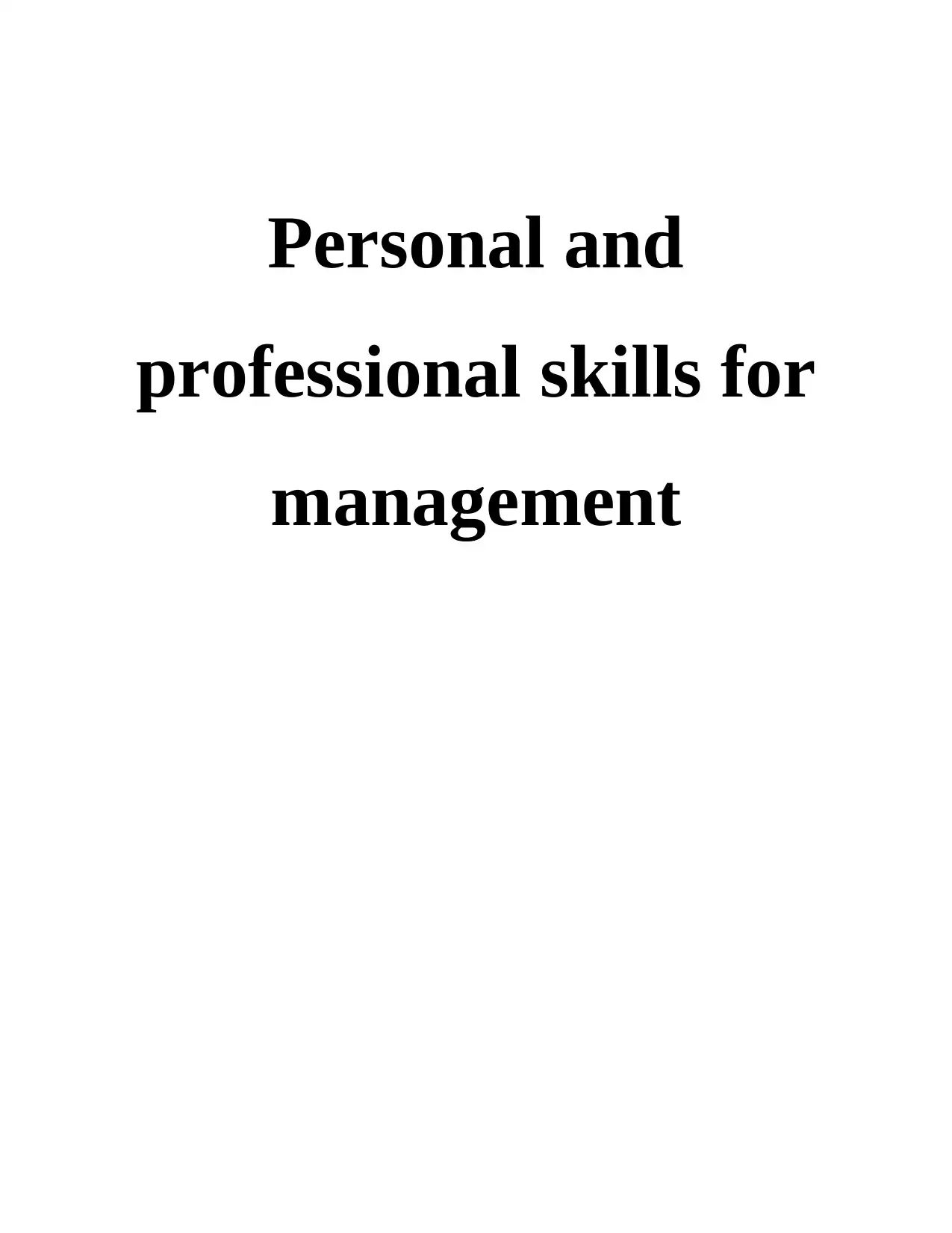
Personal and
professional skills for
management
professional skills for
management
Paraphrase This Document
Need a fresh take? Get an instant paraphrase of this document with our AI Paraphraser
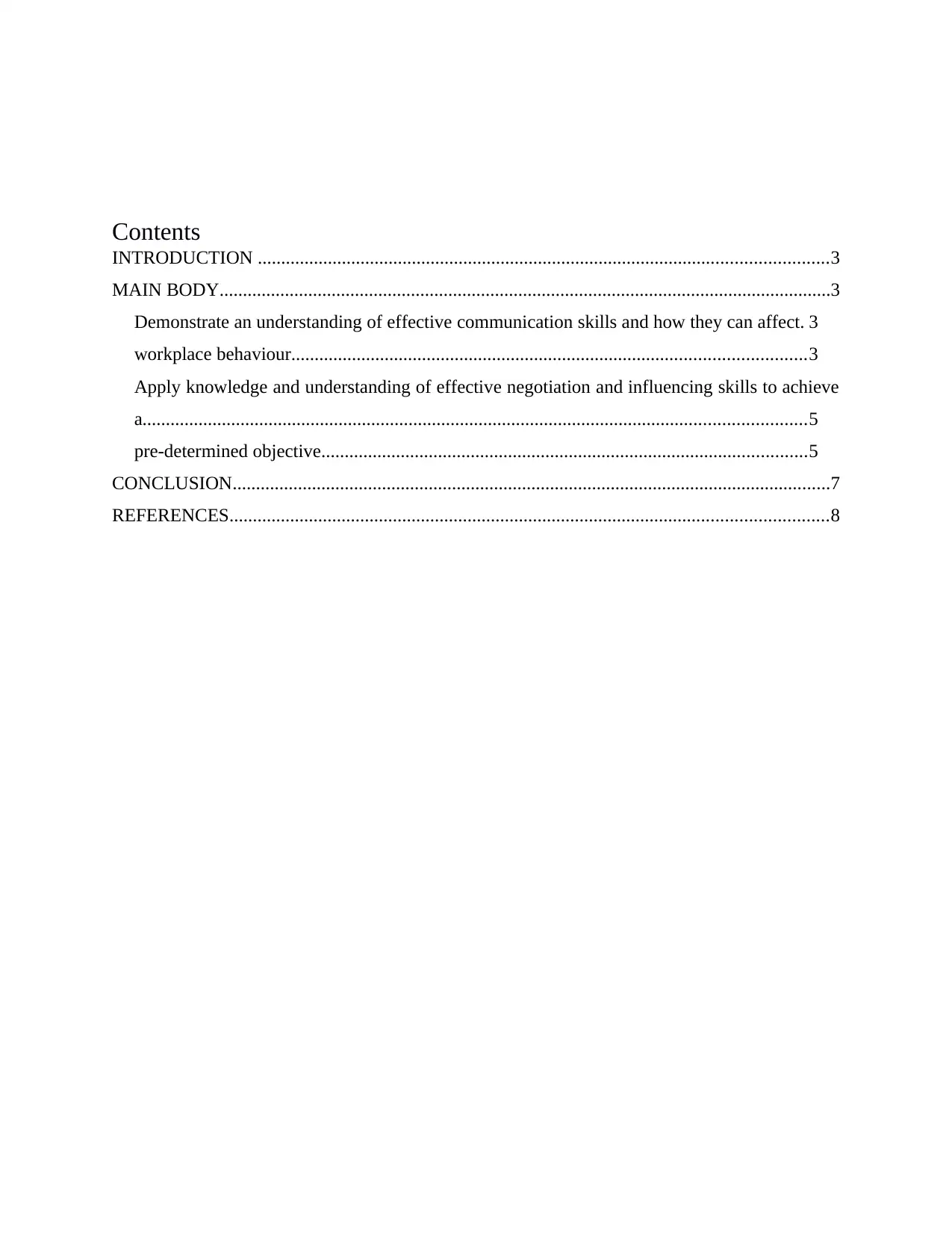
Contents
INTRODUCTION ..........................................................................................................................3
MAIN BODY...................................................................................................................................3
Demonstrate an understanding of effective communication skills and how they can affect. 3
workplace behaviour..............................................................................................................3
Apply knowledge and understanding of effective negotiation and influencing skills to achieve
a..............................................................................................................................................5
pre-determined objective........................................................................................................5
CONCLUSION................................................................................................................................7
REFERENCES................................................................................................................................8
INTRODUCTION ..........................................................................................................................3
MAIN BODY...................................................................................................................................3
Demonstrate an understanding of effective communication skills and how they can affect. 3
workplace behaviour..............................................................................................................3
Apply knowledge and understanding of effective negotiation and influencing skills to achieve
a..............................................................................................................................................5
pre-determined objective........................................................................................................5
CONCLUSION................................................................................................................................7
REFERENCES................................................................................................................................8
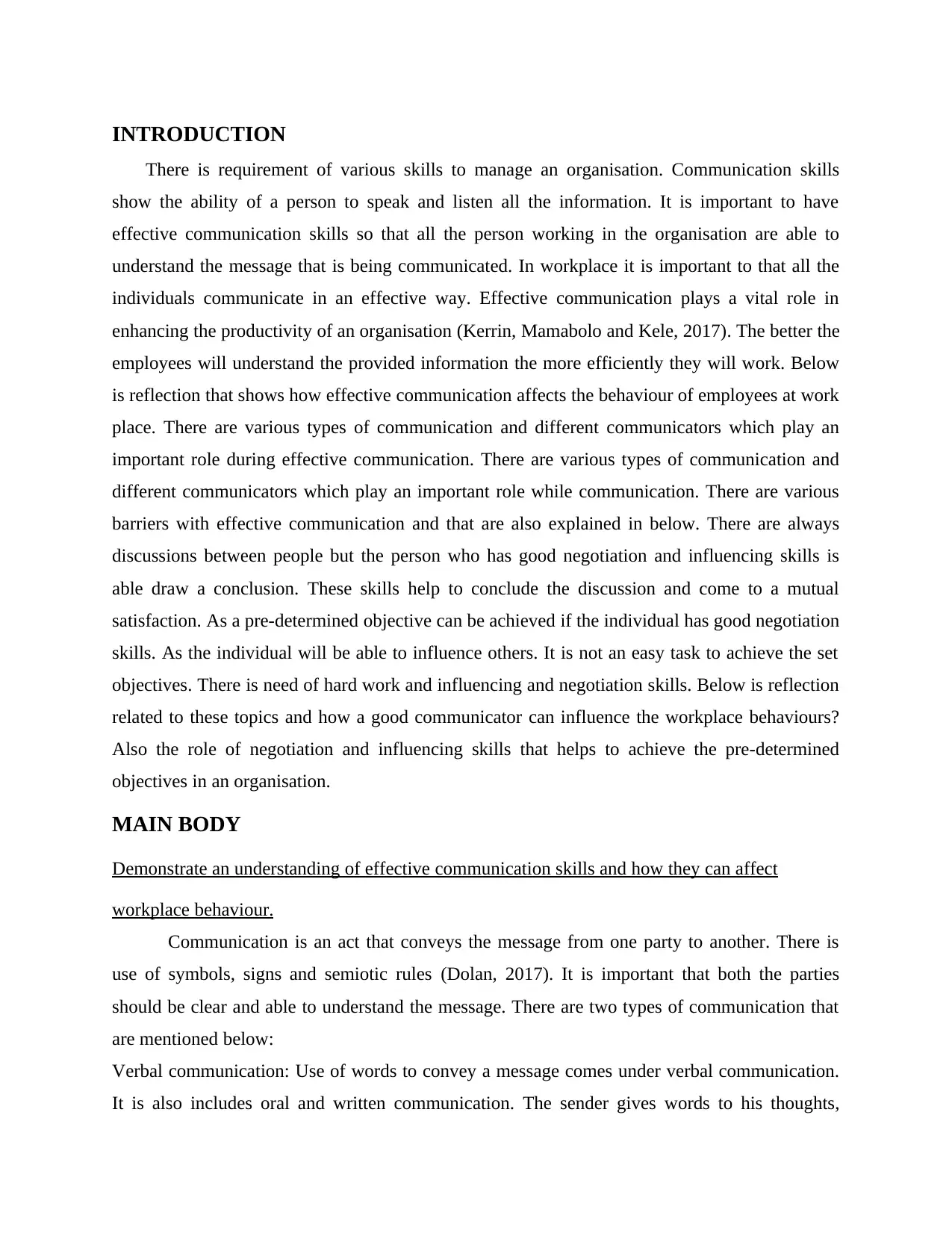
INTRODUCTION
There is requirement of various skills to manage an organisation. Communication skills
show the ability of a person to speak and listen all the information. It is important to have
effective communication skills so that all the person working in the organisation are able to
understand the message that is being communicated. In workplace it is important to that all the
individuals communicate in an effective way. Effective communication plays a vital role in
enhancing the productivity of an organisation (Kerrin, Mamabolo and Kele, 2017). The better the
employees will understand the provided information the more efficiently they will work. Below
is reflection that shows how effective communication affects the behaviour of employees at work
place. There are various types of communication and different communicators which play an
important role during effective communication. There are various types of communication and
different communicators which play an important role while communication. There are various
barriers with effective communication and that are also explained in below. There are always
discussions between people but the person who has good negotiation and influencing skills is
able draw a conclusion. These skills help to conclude the discussion and come to a mutual
satisfaction. As a pre-determined objective can be achieved if the individual has good negotiation
skills. As the individual will be able to influence others. It is not an easy task to achieve the set
objectives. There is need of hard work and influencing and negotiation skills. Below is reflection
related to these topics and how a good communicator can influence the workplace behaviours?
Also the role of negotiation and influencing skills that helps to achieve the pre-determined
objectives in an organisation.
MAIN BODY
Demonstrate an understanding of effective communication skills and how they can affect
workplace behaviour.
Communication is an act that conveys the message from one party to another. There is
use of symbols, signs and semiotic rules (Dolan, 2017). It is important that both the parties
should be clear and able to understand the message. There are two types of communication that
are mentioned below:
Verbal communication: Use of words to convey a message comes under verbal communication.
It is also includes oral and written communication. The sender gives words to his thoughts,
There is requirement of various skills to manage an organisation. Communication skills
show the ability of a person to speak and listen all the information. It is important to have
effective communication skills so that all the person working in the organisation are able to
understand the message that is being communicated. In workplace it is important to that all the
individuals communicate in an effective way. Effective communication plays a vital role in
enhancing the productivity of an organisation (Kerrin, Mamabolo and Kele, 2017). The better the
employees will understand the provided information the more efficiently they will work. Below
is reflection that shows how effective communication affects the behaviour of employees at work
place. There are various types of communication and different communicators which play an
important role during effective communication. There are various types of communication and
different communicators which play an important role while communication. There are various
barriers with effective communication and that are also explained in below. There are always
discussions between people but the person who has good negotiation and influencing skills is
able draw a conclusion. These skills help to conclude the discussion and come to a mutual
satisfaction. As a pre-determined objective can be achieved if the individual has good negotiation
skills. As the individual will be able to influence others. It is not an easy task to achieve the set
objectives. There is need of hard work and influencing and negotiation skills. Below is reflection
related to these topics and how a good communicator can influence the workplace behaviours?
Also the role of negotiation and influencing skills that helps to achieve the pre-determined
objectives in an organisation.
MAIN BODY
Demonstrate an understanding of effective communication skills and how they can affect
workplace behaviour.
Communication is an act that conveys the message from one party to another. There is
use of symbols, signs and semiotic rules (Dolan, 2017). It is important that both the parties
should be clear and able to understand the message. There are two types of communication that
are mentioned below:
Verbal communication: Use of words to convey a message comes under verbal communication.
It is also includes oral and written communication. The sender gives words to his thoughts,
⊘ This is a preview!⊘
Do you want full access?
Subscribe today to unlock all pages.

Trusted by 1+ million students worldwide
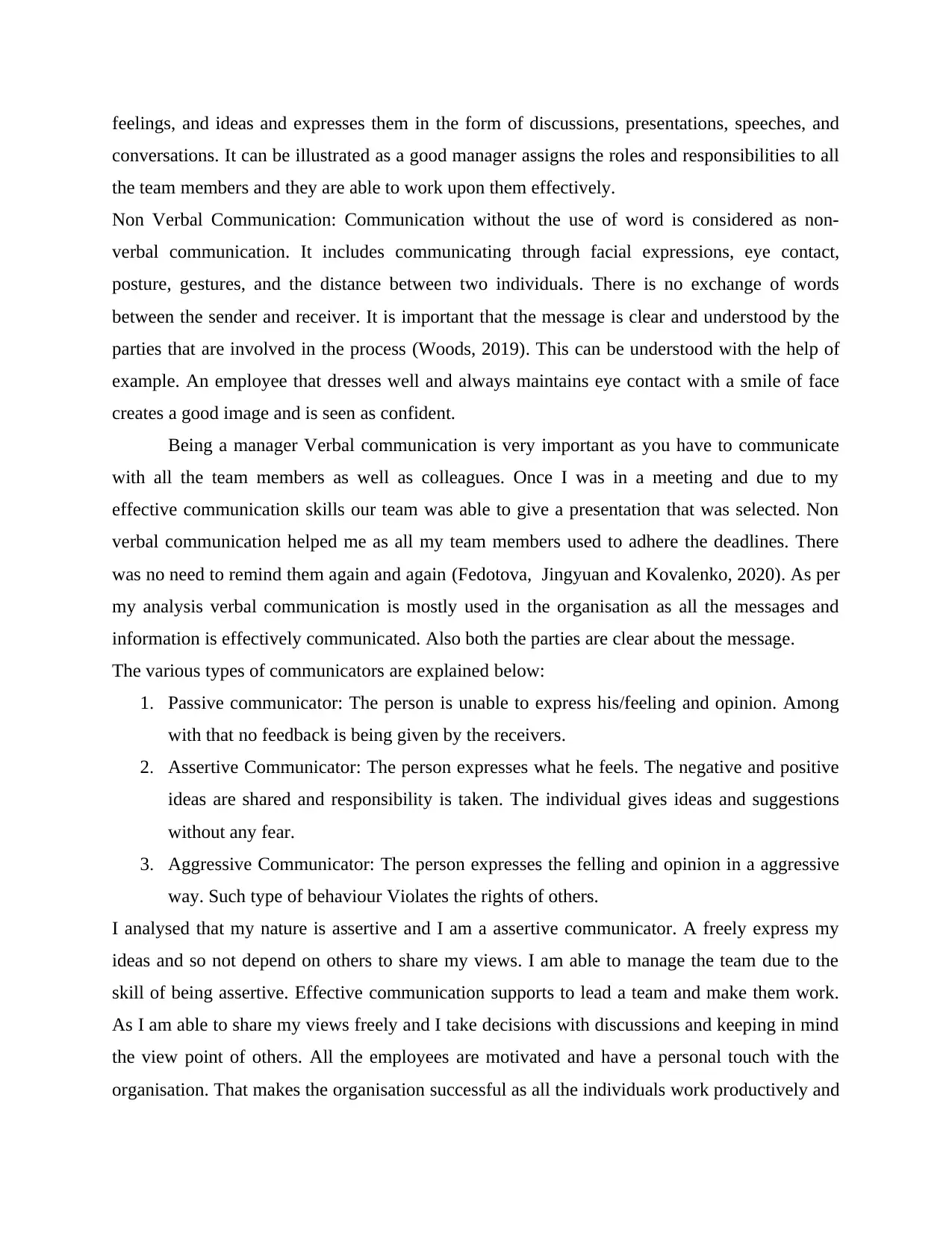
feelings, and ideas and expresses them in the form of discussions, presentations, speeches, and
conversations. It can be illustrated as a good manager assigns the roles and responsibilities to all
the team members and they are able to work upon them effectively.
Non Verbal Communication: Communication without the use of word is considered as non-
verbal communication. It includes communicating through facial expressions, eye contact,
posture, gestures, and the distance between two individuals. There is no exchange of words
between the sender and receiver. It is important that the message is clear and understood by the
parties that are involved in the process (Woods, 2019). This can be understood with the help of
example. An employee that dresses well and always maintains eye contact with a smile of face
creates a good image and is seen as confident.
Being a manager Verbal communication is very important as you have to communicate
with all the team members as well as colleagues. Once I was in a meeting and due to my
effective communication skills our team was able to give a presentation that was selected. Non
verbal communication helped me as all my team members used to adhere the deadlines. There
was no need to remind them again and again (Fedotova, Jingyuan and Kovalenko, 2020). As per
my analysis verbal communication is mostly used in the organisation as all the messages and
information is effectively communicated. Also both the parties are clear about the message.
The various types of communicators are explained below:
1. Passive communicator: The person is unable to express his/feeling and opinion. Among
with that no feedback is being given by the receivers.
2. Assertive Communicator: The person expresses what he feels. The negative and positive
ideas are shared and responsibility is taken. The individual gives ideas and suggestions
without any fear.
3. Aggressive Communicator: The person expresses the felling and opinion in a aggressive
way. Such type of behaviour Violates the rights of others.
I analysed that my nature is assertive and I am a assertive communicator. A freely express my
ideas and so not depend on others to share my views. I am able to manage the team due to the
skill of being assertive. Effective communication supports to lead a team and make them work.
As I am able to share my views freely and I take decisions with discussions and keeping in mind
the view point of others. All the employees are motivated and have a personal touch with the
organisation. That makes the organisation successful as all the individuals work productively and
conversations. It can be illustrated as a good manager assigns the roles and responsibilities to all
the team members and they are able to work upon them effectively.
Non Verbal Communication: Communication without the use of word is considered as non-
verbal communication. It includes communicating through facial expressions, eye contact,
posture, gestures, and the distance between two individuals. There is no exchange of words
between the sender and receiver. It is important that the message is clear and understood by the
parties that are involved in the process (Woods, 2019). This can be understood with the help of
example. An employee that dresses well and always maintains eye contact with a smile of face
creates a good image and is seen as confident.
Being a manager Verbal communication is very important as you have to communicate
with all the team members as well as colleagues. Once I was in a meeting and due to my
effective communication skills our team was able to give a presentation that was selected. Non
verbal communication helped me as all my team members used to adhere the deadlines. There
was no need to remind them again and again (Fedotova, Jingyuan and Kovalenko, 2020). As per
my analysis verbal communication is mostly used in the organisation as all the messages and
information is effectively communicated. Also both the parties are clear about the message.
The various types of communicators are explained below:
1. Passive communicator: The person is unable to express his/feeling and opinion. Among
with that no feedback is being given by the receivers.
2. Assertive Communicator: The person expresses what he feels. The negative and positive
ideas are shared and responsibility is taken. The individual gives ideas and suggestions
without any fear.
3. Aggressive Communicator: The person expresses the felling and opinion in a aggressive
way. Such type of behaviour Violates the rights of others.
I analysed that my nature is assertive and I am a assertive communicator. A freely express my
ideas and so not depend on others to share my views. I am able to manage the team due to the
skill of being assertive. Effective communication supports to lead a team and make them work.
As I am able to share my views freely and I take decisions with discussions and keeping in mind
the view point of others. All the employees are motivated and have a personal touch with the
organisation. That makes the organisation successful as all the individuals work productively and
Paraphrase This Document
Need a fresh take? Get an instant paraphrase of this document with our AI Paraphraser
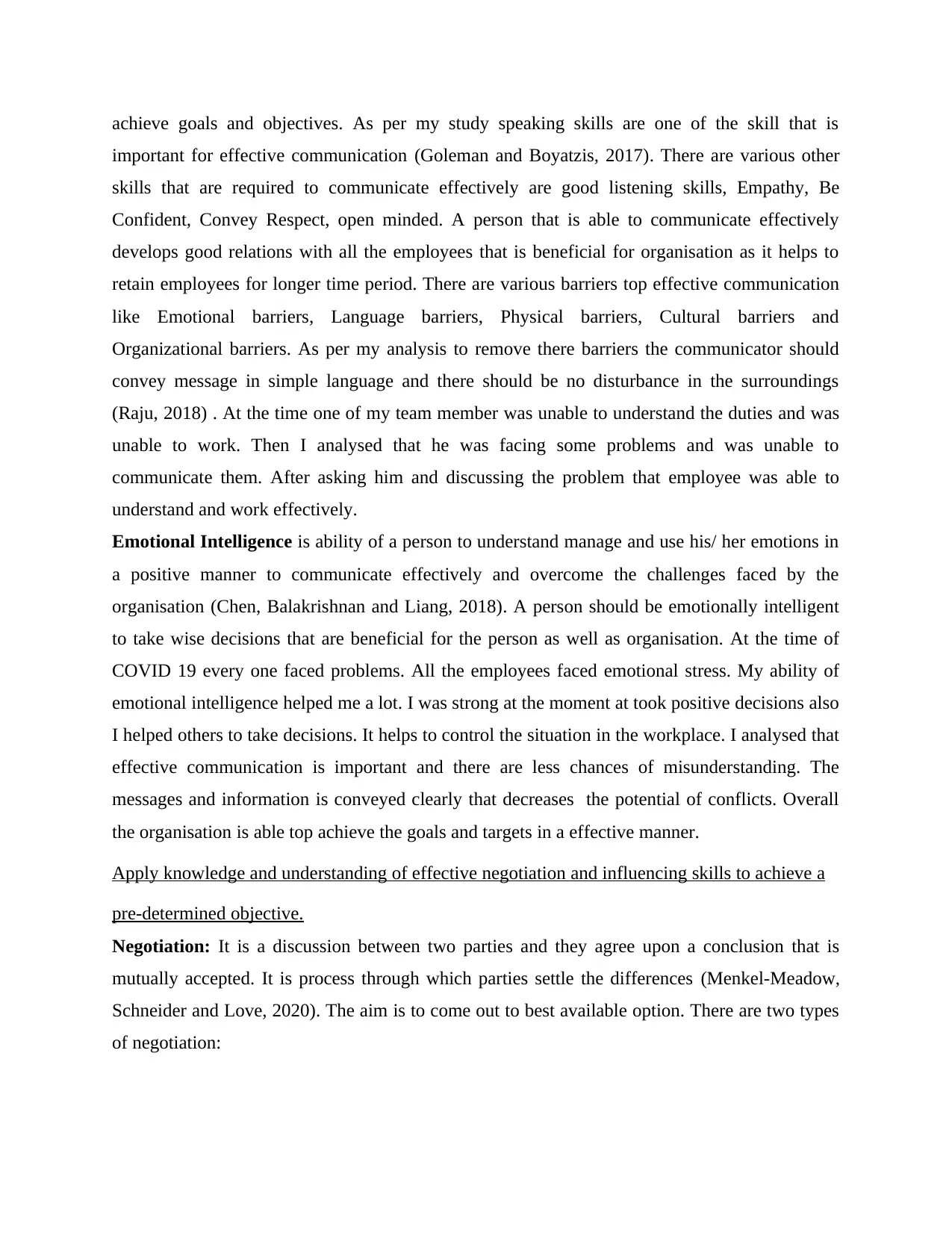
achieve goals and objectives. As per my study speaking skills are one of the skill that is
important for effective communication (Goleman and Boyatzis, 2017). There are various other
skills that are required to communicate effectively are good listening skills, Empathy, Be
Confident, Convey Respect, open minded. A person that is able to communicate effectively
develops good relations with all the employees that is beneficial for organisation as it helps to
retain employees for longer time period. There are various barriers top effective communication
like Emotional barriers, Language barriers, Physical barriers, Cultural barriers and
Organizational barriers. As per my analysis to remove there barriers the communicator should
convey message in simple language and there should be no disturbance in the surroundings
(Raju, 2018) . At the time one of my team member was unable to understand the duties and was
unable to work. Then I analysed that he was facing some problems and was unable to
communicate them. After asking him and discussing the problem that employee was able to
understand and work effectively.
Emotional Intelligence is ability of a person to understand manage and use his/ her emotions in
a positive manner to communicate effectively and overcome the challenges faced by the
organisation (Chen, Balakrishnan and Liang, 2018). A person should be emotionally intelligent
to take wise decisions that are beneficial for the person as well as organisation. At the time of
COVID 19 every one faced problems. All the employees faced emotional stress. My ability of
emotional intelligence helped me a lot. I was strong at the moment at took positive decisions also
I helped others to take decisions. It helps to control the situation in the workplace. I analysed that
effective communication is important and there are less chances of misunderstanding. The
messages and information is conveyed clearly that decreases the potential of conflicts. Overall
the organisation is able top achieve the goals and targets in a effective manner.
Apply knowledge and understanding of effective negotiation and influencing skills to achieve a
pre-determined objective.
Negotiation: It is a discussion between two parties and they agree upon a conclusion that is
mutually accepted. It is process through which parties settle the differences (Menkel-Meadow,
Schneider and Love, 2020). The aim is to come out to best available option. There are two types
of negotiation:
important for effective communication (Goleman and Boyatzis, 2017). There are various other
skills that are required to communicate effectively are good listening skills, Empathy, Be
Confident, Convey Respect, open minded. A person that is able to communicate effectively
develops good relations with all the employees that is beneficial for organisation as it helps to
retain employees for longer time period. There are various barriers top effective communication
like Emotional barriers, Language barriers, Physical barriers, Cultural barriers and
Organizational barriers. As per my analysis to remove there barriers the communicator should
convey message in simple language and there should be no disturbance in the surroundings
(Raju, 2018) . At the time one of my team member was unable to understand the duties and was
unable to work. Then I analysed that he was facing some problems and was unable to
communicate them. After asking him and discussing the problem that employee was able to
understand and work effectively.
Emotional Intelligence is ability of a person to understand manage and use his/ her emotions in
a positive manner to communicate effectively and overcome the challenges faced by the
organisation (Chen, Balakrishnan and Liang, 2018). A person should be emotionally intelligent
to take wise decisions that are beneficial for the person as well as organisation. At the time of
COVID 19 every one faced problems. All the employees faced emotional stress. My ability of
emotional intelligence helped me a lot. I was strong at the moment at took positive decisions also
I helped others to take decisions. It helps to control the situation in the workplace. I analysed that
effective communication is important and there are less chances of misunderstanding. The
messages and information is conveyed clearly that decreases the potential of conflicts. Overall
the organisation is able top achieve the goals and targets in a effective manner.
Apply knowledge and understanding of effective negotiation and influencing skills to achieve a
pre-determined objective.
Negotiation: It is a discussion between two parties and they agree upon a conclusion that is
mutually accepted. It is process through which parties settle the differences (Menkel-Meadow,
Schneider and Love, 2020). The aim is to come out to best available option. There are two types
of negotiation:
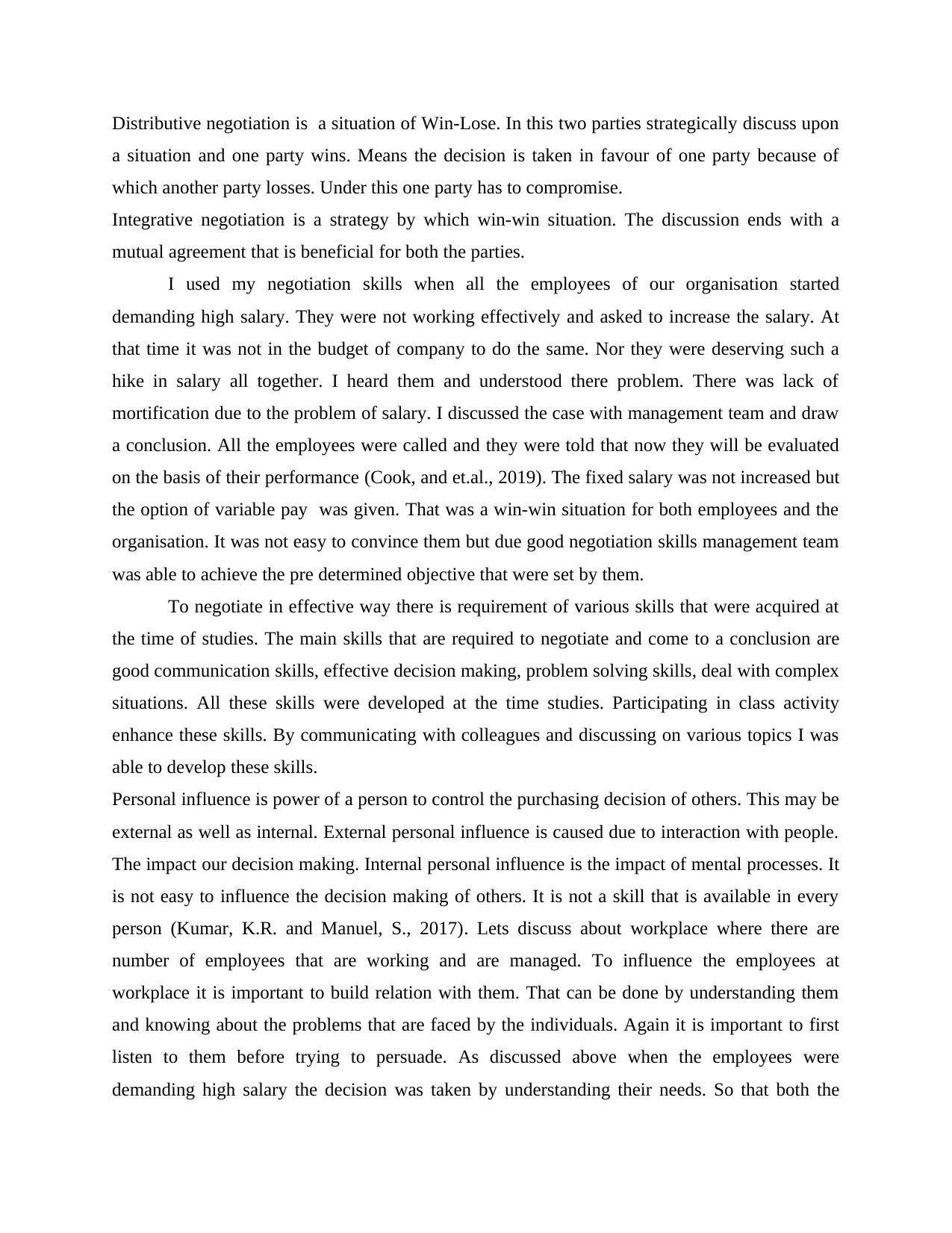
Distributive negotiation is a situation of Win-Lose. In this two parties strategically discuss upon
a situation and one party wins. Means the decision is taken in favour of one party because of
which another party losses. Under this one party has to compromise.
Integrative negotiation is a strategy by which win-win situation. The discussion ends with a
mutual agreement that is beneficial for both the parties.
I used my negotiation skills when all the employees of our organisation started
demanding high salary. They were not working effectively and asked to increase the salary. At
that time it was not in the budget of company to do the same. Nor they were deserving such a
hike in salary all together. I heard them and understood there problem. There was lack of
mortification due to the problem of salary. I discussed the case with management team and draw
a conclusion. All the employees were called and they were told that now they will be evaluated
on the basis of their performance (Cook, and et.al., 2019). The fixed salary was not increased but
the option of variable pay was given. That was a win-win situation for both employees and the
organisation. It was not easy to convince them but due good negotiation skills management team
was able to achieve the pre determined objective that were set by them.
To negotiate in effective way there is requirement of various skills that were acquired at
the time of studies. The main skills that are required to negotiate and come to a conclusion are
good communication skills, effective decision making, problem solving skills, deal with complex
situations. All these skills were developed at the time studies. Participating in class activity
enhance these skills. By communicating with colleagues and discussing on various topics I was
able to develop these skills.
Personal influence is power of a person to control the purchasing decision of others. This may be
external as well as internal. External personal influence is caused due to interaction with people.
The impact our decision making. Internal personal influence is the impact of mental processes. It
is not easy to influence the decision making of others. It is not a skill that is available in every
person (Kumar, K.R. and Manuel, S., 2017). Lets discuss about workplace where there are
number of employees that are working and are managed. To influence the employees at
workplace it is important to build relation with them. That can be done by understanding them
and knowing about the problems that are faced by the individuals. Again it is important to first
listen to them before trying to persuade. As discussed above when the employees were
demanding high salary the decision was taken by understanding their needs. So that both the
a situation and one party wins. Means the decision is taken in favour of one party because of
which another party losses. Under this one party has to compromise.
Integrative negotiation is a strategy by which win-win situation. The discussion ends with a
mutual agreement that is beneficial for both the parties.
I used my negotiation skills when all the employees of our organisation started
demanding high salary. They were not working effectively and asked to increase the salary. At
that time it was not in the budget of company to do the same. Nor they were deserving such a
hike in salary all together. I heard them and understood there problem. There was lack of
mortification due to the problem of salary. I discussed the case with management team and draw
a conclusion. All the employees were called and they were told that now they will be evaluated
on the basis of their performance (Cook, and et.al., 2019). The fixed salary was not increased but
the option of variable pay was given. That was a win-win situation for both employees and the
organisation. It was not easy to convince them but due good negotiation skills management team
was able to achieve the pre determined objective that were set by them.
To negotiate in effective way there is requirement of various skills that were acquired at
the time of studies. The main skills that are required to negotiate and come to a conclusion are
good communication skills, effective decision making, problem solving skills, deal with complex
situations. All these skills were developed at the time studies. Participating in class activity
enhance these skills. By communicating with colleagues and discussing on various topics I was
able to develop these skills.
Personal influence is power of a person to control the purchasing decision of others. This may be
external as well as internal. External personal influence is caused due to interaction with people.
The impact our decision making. Internal personal influence is the impact of mental processes. It
is not easy to influence the decision making of others. It is not a skill that is available in every
person (Kumar, K.R. and Manuel, S., 2017). Lets discuss about workplace where there are
number of employees that are working and are managed. To influence the employees at
workplace it is important to build relation with them. That can be done by understanding them
and knowing about the problems that are faced by the individuals. Again it is important to first
listen to them before trying to persuade. As discussed above when the employees were
demanding high salary the decision was taken by understanding their needs. So that both the
⊘ This is a preview!⊘
Do you want full access?
Subscribe today to unlock all pages.

Trusted by 1+ million students worldwide
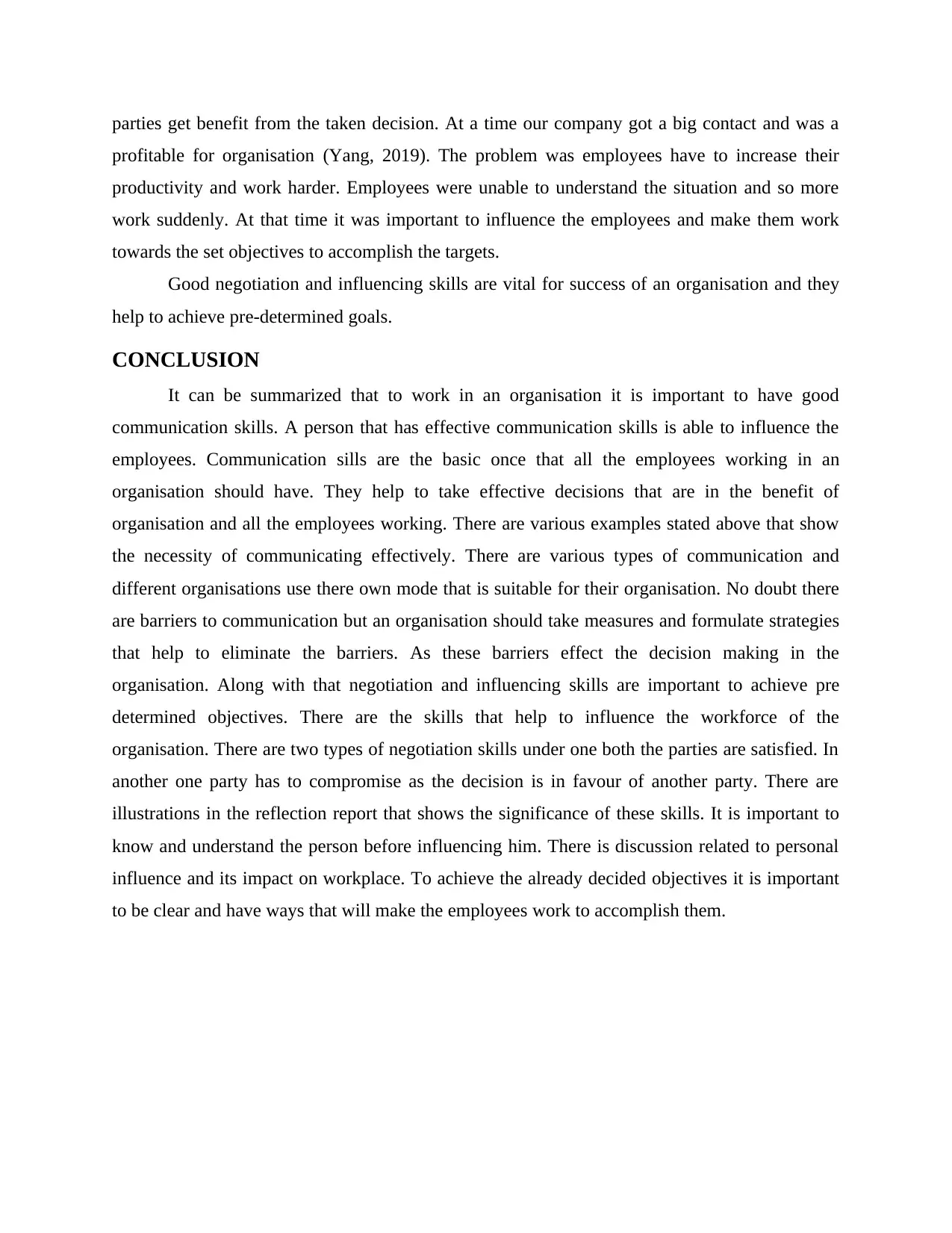
parties get benefit from the taken decision. At a time our company got a big contact and was a
profitable for organisation (Yang, 2019). The problem was employees have to increase their
productivity and work harder. Employees were unable to understand the situation and so more
work suddenly. At that time it was important to influence the employees and make them work
towards the set objectives to accomplish the targets.
Good negotiation and influencing skills are vital for success of an organisation and they
help to achieve pre-determined goals.
CONCLUSION
It can be summarized that to work in an organisation it is important to have good
communication skills. A person that has effective communication skills is able to influence the
employees. Communication sills are the basic once that all the employees working in an
organisation should have. They help to take effective decisions that are in the benefit of
organisation and all the employees working. There are various examples stated above that show
the necessity of communicating effectively. There are various types of communication and
different organisations use there own mode that is suitable for their organisation. No doubt there
are barriers to communication but an organisation should take measures and formulate strategies
that help to eliminate the barriers. As these barriers effect the decision making in the
organisation. Along with that negotiation and influencing skills are important to achieve pre
determined objectives. There are the skills that help to influence the workforce of the
organisation. There are two types of negotiation skills under one both the parties are satisfied. In
another one party has to compromise as the decision is in favour of another party. There are
illustrations in the reflection report that shows the significance of these skills. It is important to
know and understand the person before influencing him. There is discussion related to personal
influence and its impact on workplace. To achieve the already decided objectives it is important
to be clear and have ways that will make the employees work to accomplish them.
profitable for organisation (Yang, 2019). The problem was employees have to increase their
productivity and work harder. Employees were unable to understand the situation and so more
work suddenly. At that time it was important to influence the employees and make them work
towards the set objectives to accomplish the targets.
Good negotiation and influencing skills are vital for success of an organisation and they
help to achieve pre-determined goals.
CONCLUSION
It can be summarized that to work in an organisation it is important to have good
communication skills. A person that has effective communication skills is able to influence the
employees. Communication sills are the basic once that all the employees working in an
organisation should have. They help to take effective decisions that are in the benefit of
organisation and all the employees working. There are various examples stated above that show
the necessity of communicating effectively. There are various types of communication and
different organisations use there own mode that is suitable for their organisation. No doubt there
are barriers to communication but an organisation should take measures and formulate strategies
that help to eliminate the barriers. As these barriers effect the decision making in the
organisation. Along with that negotiation and influencing skills are important to achieve pre
determined objectives. There are the skills that help to influence the workforce of the
organisation. There are two types of negotiation skills under one both the parties are satisfied. In
another one party has to compromise as the decision is in favour of another party. There are
illustrations in the reflection report that shows the significance of these skills. It is important to
know and understand the person before influencing him. There is discussion related to personal
influence and its impact on workplace. To achieve the already decided objectives it is important
to be clear and have ways that will make the employees work to accomplish them.
Paraphrase This Document
Need a fresh take? Get an instant paraphrase of this document with our AI Paraphraser
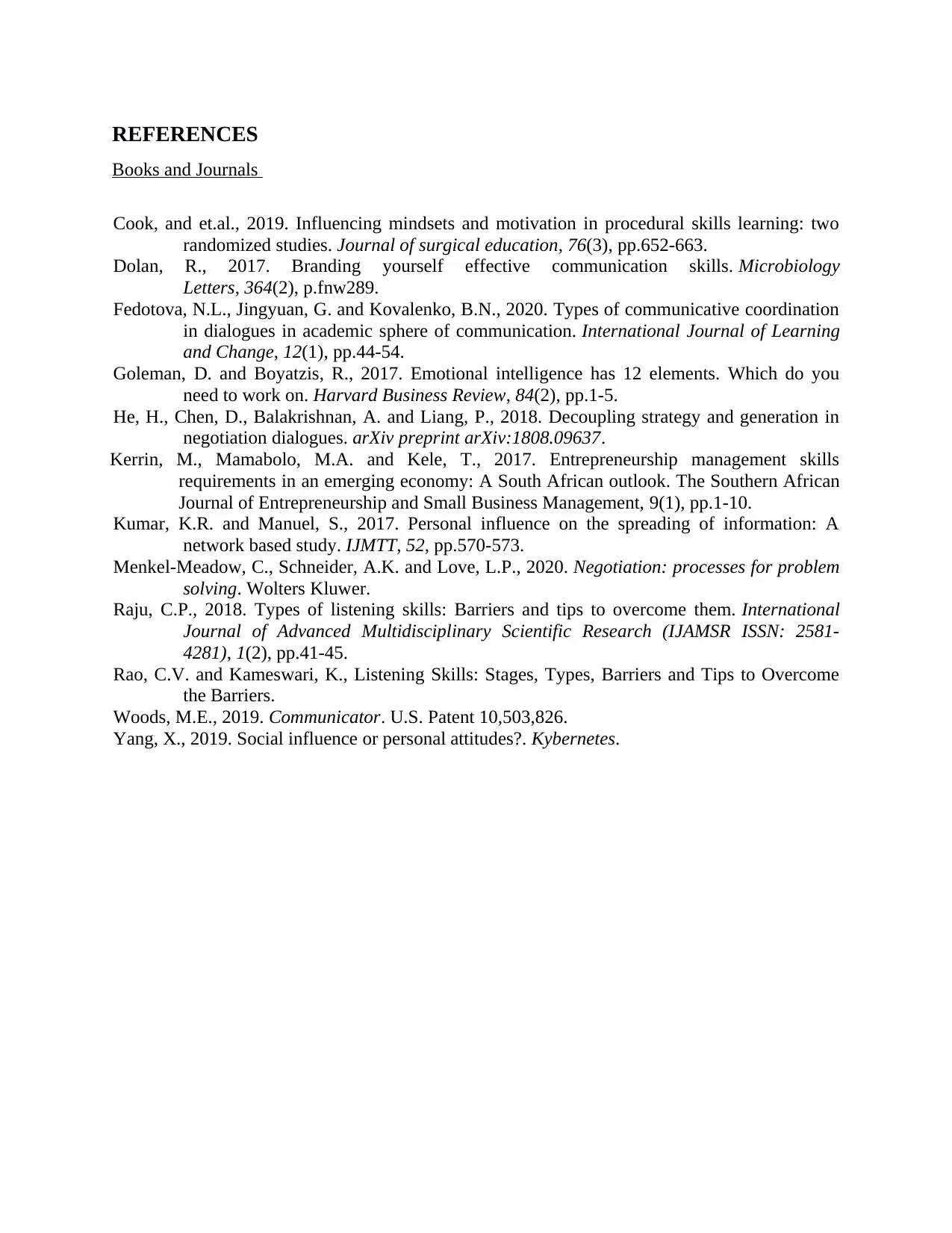
REFERENCES
Books and Journals
Cook, and et.al., 2019. Influencing mindsets and motivation in procedural skills learning: two
randomized studies. Journal of surgical education, 76(3), pp.652-663.
Dolan, R., 2017. Branding yourself effective communication skills. Microbiology
Letters, 364(2), p.fnw289.
Fedotova, N.L., Jingyuan, G. and Kovalenko, B.N., 2020. Types of communicative coordination
in dialogues in academic sphere of communication. International Journal of Learning
and Change, 12(1), pp.44-54.
Goleman, D. and Boyatzis, R., 2017. Emotional intelligence has 12 elements. Which do you
need to work on. Harvard Business Review, 84(2), pp.1-5.
He, H., Chen, D., Balakrishnan, A. and Liang, P., 2018. Decoupling strategy and generation in
negotiation dialogues. arXiv preprint arXiv:1808.09637.
Kerrin, M., Mamabolo, M.A. and Kele, T., 2017. Entrepreneurship management skills
requirements in an emerging economy: A South African outlook. The Southern African
Journal of Entrepreneurship and Small Business Management, 9(1), pp.1-10.
Kumar, K.R. and Manuel, S., 2017. Personal influence on the spreading of information: A
network based study. IJMTT, 52, pp.570-573.
Menkel-Meadow, C., Schneider, A.K. and Love, L.P., 2020. Negotiation: processes for problem
solving. Wolters Kluwer.
Raju, C.P., 2018. Types of listening skills: Barriers and tips to overcome them. International
Journal of Advanced Multidisciplinary Scientific Research (IJAMSR ISSN: 2581-
4281), 1(2), pp.41-45.
Rao, C.V. and Kameswari, K., Listening Skills: Stages, Types, Barriers and Tips to Overcome
the Barriers.
Woods, M.E., 2019. Communicator. U.S. Patent 10,503,826.
Yang, X., 2019. Social influence or personal attitudes?. Kybernetes.
Books and Journals
Cook, and et.al., 2019. Influencing mindsets and motivation in procedural skills learning: two
randomized studies. Journal of surgical education, 76(3), pp.652-663.
Dolan, R., 2017. Branding yourself effective communication skills. Microbiology
Letters, 364(2), p.fnw289.
Fedotova, N.L., Jingyuan, G. and Kovalenko, B.N., 2020. Types of communicative coordination
in dialogues in academic sphere of communication. International Journal of Learning
and Change, 12(1), pp.44-54.
Goleman, D. and Boyatzis, R., 2017. Emotional intelligence has 12 elements. Which do you
need to work on. Harvard Business Review, 84(2), pp.1-5.
He, H., Chen, D., Balakrishnan, A. and Liang, P., 2018. Decoupling strategy and generation in
negotiation dialogues. arXiv preprint arXiv:1808.09637.
Kerrin, M., Mamabolo, M.A. and Kele, T., 2017. Entrepreneurship management skills
requirements in an emerging economy: A South African outlook. The Southern African
Journal of Entrepreneurship and Small Business Management, 9(1), pp.1-10.
Kumar, K.R. and Manuel, S., 2017. Personal influence on the spreading of information: A
network based study. IJMTT, 52, pp.570-573.
Menkel-Meadow, C., Schneider, A.K. and Love, L.P., 2020. Negotiation: processes for problem
solving. Wolters Kluwer.
Raju, C.P., 2018. Types of listening skills: Barriers and tips to overcome them. International
Journal of Advanced Multidisciplinary Scientific Research (IJAMSR ISSN: 2581-
4281), 1(2), pp.41-45.
Rao, C.V. and Kameswari, K., Listening Skills: Stages, Types, Barriers and Tips to Overcome
the Barriers.
Woods, M.E., 2019. Communicator. U.S. Patent 10,503,826.
Yang, X., 2019. Social influence or personal attitudes?. Kybernetes.
1 out of 8
Related Documents
Your All-in-One AI-Powered Toolkit for Academic Success.
+13062052269
info@desklib.com
Available 24*7 on WhatsApp / Email
![[object Object]](/_next/static/media/star-bottom.7253800d.svg)
Unlock your academic potential
Copyright © 2020–2026 A2Z Services. All Rights Reserved. Developed and managed by ZUCOL.




